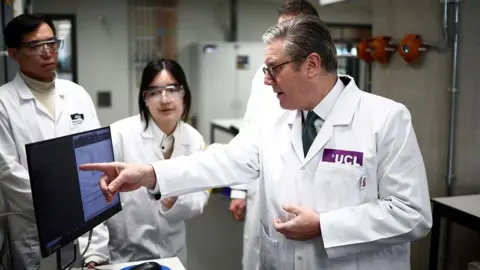In the recent discussion surrounding Sir Keir Starmer’s initiative for the UK to become a global leader in Artificial Intelligence (AI), a significant concern has emerged: the potential strain on water resources. Reports from various industry sources indicate that the enormous data centers required to support AI operations could significantly impact the availability of drinking water in the UK, particularly in regions already grappling with water scarcity.
Data centers, vital for AI functionalities, require substantial water usage for cooling purposes to prevent overheating. The tech industry is currently in the process of developing more effective cooling systems that consume less water. However, the Department for Science, Innovation, and Technology has acknowledged that these facilities face considerable sustainability challenges. While the government has committed to establishing multiple data centers across the UK to bolster economic growth, this raises questions about water availability, especially as parts of the country, particularly the south, are facing water shortages exacerbated by climate change and population increases.
The UK government is backing plans for nine new reservoirs aimed at mitigating risks of water rationing and hosepipe bans during periods of drought. Yet, these proposed reservoirs are also located in regions where new data centers are set to be constructed. One notable “AI growth zone” is set to be developed in Culham, Oxfordshire, which is only seven miles from a planned reservoir site at Abingdon. This reservoir is positioned to serve clients in the Thames Valley, London, and Hampshire, but it remains uncertain how much water the nearby data centers will siphon from it.
Over the past year, Thames Water has initiated discussions with the government regarding the water demand from data centers and potential mitigatory measures. A report by the Royal Academy of Engineering has urged the government to require tech firms to report their energy and water consumption in a transparent manner. The report advocates for environmental sustainability practices, which would include reducing freshwater usage for cooling purposes. One of the report’s authors, Professor Tom Rodden, warns that failure to address these issues could lead to significant environmental damage as AI technologies proliferate.
In terms of actual water utilization, there is often a lack of clarity from the tech industry regarding the amounts consumed. Most data centers in the UK have been reticent when contacted for information on their water use. Typically, these centers use mains water for cooling, in order to avoid contamination issues that might arise from using surface water. A water resource management expert, Dr. Venkatesh Uddameri, estimates that a standard data center could consume between 11 million to 19 million liters daily – roughly equivalent to the daily consumption of a population of 30,000 to 50,000 people.
The current narrative suggests that modernization within data center operations may lead to greater efficiencies, with examples from Microsoft indicating a substantial increase in water consumption during the development stages of AI applications. Meanwhile, local opposition against data centers has been gaining momentum, particularly in areas where freshwater resources are at risk. For instance, Google’s halted plans for a data center in Chile were attributed to severe local water concerns.
To address potential water shortages resulting from upcoming data centers, Thames Water has warned that facilities could face usage restrictions during heatwaves. Recently, evidence emerged suggesting that Thames Water was still unaware of the actual water utilization figures from its existing data center clients. This presents a critical challenge, especially as the government reclassifies data centers as Critical National Infrastructure, which reduces planning restriction burdens.
Aaron Binckley, vice president of sustainability at Digital Realty, asserts that the industry is making noteworthy progress in water conservation initiatives. The company is employing an innovative AI tool designed to analyze operational data and predict water-saving measures, resulting in anticipated annual savings.
Amidst these developments, regulatory bodies such as the Environment Agency emphasize the need for more comprehensive data on upcoming data centers’ water needs. They project a dire requirement for water – with England expected to need an additional five billion liters daily by 2050. As the demand for water continues to escalate, robust strategies must be implemented to ensure sustainability and availability of this vital resource amidst the burgeoning landscape of AI development in the UK.











